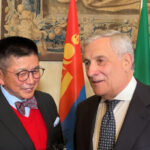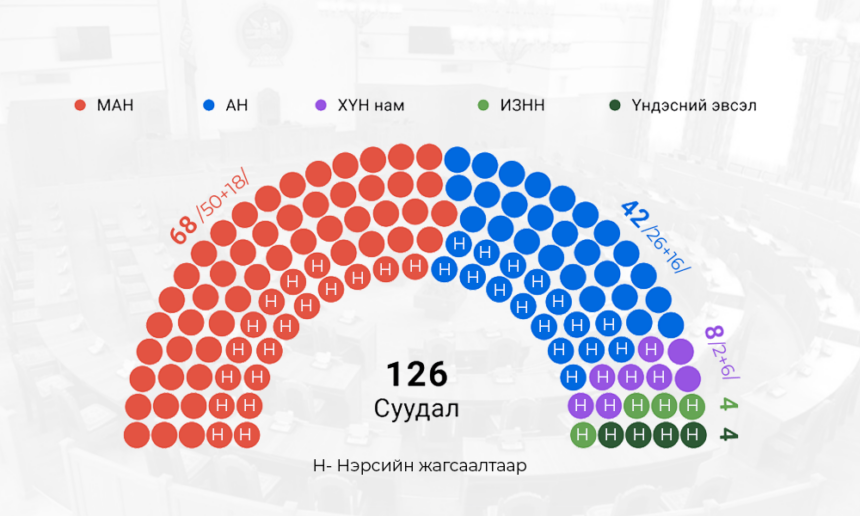The nineth parliamentary elections for democratic Mongolia took place, free and fair, on June 28th this year. Mongolia is home to 3.5 million people, of whom 2.2 million are voters. Out of 2.0 million registered voters, 1.5 million cast their vote, resulting in a voter turnout of 69.3 percent. In this election, a total of 1341 candidates ran for office from 19 parties, 2 coalitions, with 42 independent runners. This meant that 11 candidates competed for a seat at the parliament on average. In comparison, the 2020 elections had a total of 606 candidates, meaning 8 people competed for one seat.
The latest constitutional amendment changed the electoral system into mixed electoral system. The total seats at the parliament increased by 50 to 126. 48 candidates were to enter Parliament by a party-list PR whereas 78 candidates would enter through winning the most votes in their electoral districts. MPP (Mongolian People’s Party) won 68 seats (18 on the party list/50 with the most votes in their district), DP (Democratic Party) 42 seats (16/26), HUN (HUN party) 8 seats (6/2), CWGP (Civil Will-Green Party) 4 seats (4.0), and The National Coalition 4 seats (4/0). For the first time, the parliament is made up of representation from six political parties.
How are the three pillars of government – legislative, executive and judiciary impacted as a result of this election?
Legislative branch
The MPP nominated the 43-year-old D.Amarbayasgalan for the position of Chairman of parliament and it was approved. Out of 126 members of parliament, 80 or 60 percent bacame MP for the first time with the youngest being 26 years old and the oldest 73. There are 32 female MPs, meaning every fourth MP is female, surpassing the average percentage in Asia.
Most (67%) MPs are under the age of 50, with experiences growing up, acquiring secondary and higher education in a free market economy as well as working and living in such environment in post-democratic-revolutions Mongolia. These young people are not familiar with the socialist system nor the one-party rule where permits were required to move within one’s own country and obtaining a passport for foreign travel was impossible. Those young people grew up with the freedom to say what they want, travel anywhere, be educated and pursue work in developed countries.
Mongolians strived for laying the basis for free market and democratic society over a hundred years ago and sent the first batch of 35 young people to France and Germany in 1926. They were sowing the seeds of culture upon their return, only to be met with accusations of espionage for the West, consecutive arrests and executions. After that, the government had their human resource educated in socialist countries by the 50s.
The public expects that this parliament will introduce new ethics, manners, and standards of public governance learned from Western countries with advanced democracies and bring about quality changes. For example, if all citizens are provided with electronic signatures, 2028 parliamentary elections can potentially take place utilizing mobile phones.
Joint government
L.Oyun-Erdene, 43, was reappointed as the Prime Minister. By law, the party with more than 64 seats at the Parliament is allowed to form a government alone. Despite having 68 seats, MPP made a deal with DP and HUN party to form a joint government with 16 ministries and 22 ministers, allocating 6 ministies and 8 ministers to DP and 1 ministry and 2 ministers to HUN party.
The Prime Minister said that his decision to form a joint government is intended to enable the timely implementation of efforts such as eliminating corruption schemes, liberalizing the energy sector, moving the government to Khushig area without politicized delay of the issues by opposing parties.
The underlying reason for the formation of a joint government is that MPP has only received one third of the votes, leaving no choice but to team up with the other parties to garner a wider range of support.
The joint government made the agreement ‘Courage for rapid development’ by combining the agendas of each party. A tripartite policy committee was established for coordination of policies and settlement of disputes.
list of tasks to be implemented by this government includes the completion of ongoing projects, such as revival of ports, promotion of tourism, e-governance, completion of the oil refinery plant, and intensification of the infrastructure mega project “Tavantoirog”. The list also includes utilizing the national wealth fund for the implementation of health, education, housing, savings programs. Moreover, many other projects were on the list, for example, support for cooperatives, anti-desertification measures, disaster management, emergency sector reforms, construction of the highway around the capital city and Bogd Mountain, building of a bridge between the capital city and Khushig Valley, as well as solving the problems of construction and investment of Kharkhorum and New Zuunmod cities.
To do all of the above, the Prime Minister stated that an annual economic growth of 6-7% is to be achieved and that ‘special support is going to be provided for investments in industrialization, mineral exploration, green technological transition, information technologies, tourism, and agriculture’ during his speech at the Parliamentary session. However, how all these tasks will be done; or who – whether it is the state or private sector, or both; is unclear for now.
Justice and the judiciary
The judiciary system in Mongolia has become unjust and is serving people differently, resulting in unfounded persecution in some cases. It is increasingly difficult to believe that everyone is equal under the courts of justice. Corruption and human rights violations are rampant. The rule of law is incompetent due to judges making decisions based on political motives. People are accustomed to this context with conflict of interests and recklessness.
As of today, 660 laws are in place in Mongolia (The Secretary General of the Parliament Ts.Tsolmon). There are 2000 regulations as part of 430 laws. With each new law, 8 regulations are created on average. For example, the law on minerals has 38 relevant regulations. In many instances, these regulations are interpreted in dual meaning, sometimes even surpassing the power of its corresponding law. (24.04.18 Lawyers’ forum)
The prosecutors and the court are using the laws and regulations differently, resulting in end results that are poles apart. The case of the Development Bank, for example, had 81 defendants brought to the court by prosecutors, with the result being that only half of them were found guilty by the court. The coal theft case also started scandalously and ended quietly.
Some cases are solved very quickly while some big-money cases are delayed for a long time. One such instance is the 8 year long delay for the case of D.Erdenebileg, who already fled the country. Criminals who embezzled public property get caught redhandedly and arrested for questioning only to be vindicated a short while later and play the role of a victim or a hero. How do we explain this new custom where a judge who delayed the case or ruled unfairly do not take any responsibility. A recent case is the controversial closed trial for journalist N.Unurtsetseg. Is it not the time to make reforms such as mandatory representation by an attorney, court assessment of grounds for detention made by the prosecutor, and presence of grand juries as in the US.
With all the misconduct, people are now not confident in the justice system, which escalates to more widespread mistrust in the democratic system that upholds human rights and freedoms.
Political opposition
The formation of a joint government means minimized space for exercising the role of opposition in the Parliament. The leadership of the DP in the Ministry of Justice and Internal Affairs raised expectations of the people that corruption cases will be more transparent. But ultimately, time will clear up everything.
The HUN party was tasked with state procurement and ensuring fair competition. Labor productivity only increases when prices are free and the prerequisites for fair competition is there. The people are waiting to see what the HUN party will start from on the matter and how it progresses.
Inevitably, civil society organizations now need to take up the role of opposition. Even though independent journalists and the media are supposed to monitor and demand justice and fair treatment under the law, most media outlets are still owned by politicians and major companies.
This wraps up my reflections after the 2024 parliamentary elections. It is now time for the citizens and media outlets to carefully observe how life in Mongolia unfolds for the next four years and express our views when necessary. As a society, we need to be attentive, active and responsible.







